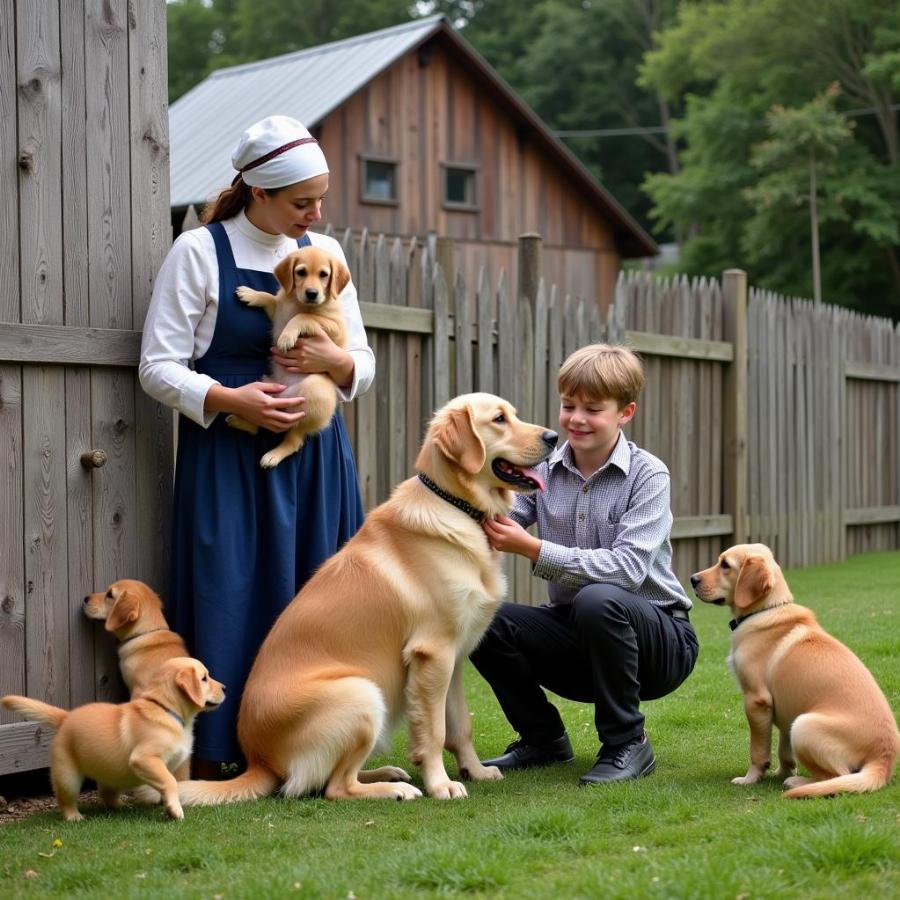Amish dog kennels have become a topic of interest for those seeking ethically-sourced puppies. Known for their simpler lifestyle and strong work ethic, the Amish community often raises dogs as part of their livelihood. But are Amish dog kennels a guarantee of responsible breeding practices and healthy puppies? This article delves into the world of Amish dog kennels, exploring both the benefits and potential concerns to help you make informed decisions.
 Amish Family with Dog and Puppies
Amish Family with Dog and Puppies
Understanding Amish Practices
To fully grasp the complexities surrounding Amish dog kennels, it’s essential to understand the Amish way of life. Living apart from modern conveniences, Amish communities prioritize tradition, hard work, and self-sufficiency. Often, this translates to raising animals for farming or as companions. However, the very aspects that define Amish culture – a detachment from mainstream regulations and a reliance on traditional methods – can also raise concerns.
The Appeal of Amish Dog Kennels
For many, the image of an Amish dog kennel evokes idyllic scenes of open spaces, fresh air, and dogs raised with a focus on natural care. Indeed, there are reputable breeders within Amish communities who genuinely prioritize the well-being of their animals. Here are some potential advantages of purchasing a puppy from a responsible Amish breeder:
- Early Socialization: Puppies raised in a family environment, often with children, may receive early socialization, which is crucial for their development into well-adjusted dogs.
- Natural Rearing: Some Amish breeders prioritize natural diets, ample outdoor space, and limited exposure to chemicals, which can be appealing to some owners.
Potential Concerns and Ethical Considerations
While the image of a traditional, wholesome upbringing is alluring, it’s important to approach the topic of Amish dog kennels with a critical eye. Not all kennels operate ethically, and the lack of standard regulations can lead to inconsistencies in care. Here are some potential concerns:
- Lack of Regulation: Unlike USDA-licensed breeders, Amish kennels often operate without external oversight, making it difficult to ensure consistent standards of care and breeding practices.
- Limited Veterinary Care: Some Amish communities rely on traditional remedies over modern veterinary medicine. While this can be beneficial in some cases, it also raises concerns about access to necessary medical treatment.
- High-Volume Breeding: Unfortunately, the demand for puppies has led to some large-scale breeding operations within Amish communities, prioritizing profit over animal welfare.
Identifying a Responsible Amish Dog Kennel
Given the potential for both positive and negative practices, it’s essential to thoroughly research any Amish dog kennel before purchasing a puppy. Here are some key questions to ask and factors to consider:
- Transparency: Is the breeder open about their practices and willing to answer your questions honestly?
- Living Conditions: Can you visit the kennel in person to see the living conditions of the dogs and puppies?
- Veterinary Care: What veterinary care do the dogs receive? Are they up-to-date on vaccinations and deworming?
- Breeding Practices: Does the breeder conduct genetic testing and prioritize the health of their breeding dogs?
- Socialization: How are the puppies socialized? Are they exposed to various sights, sounds, and experiences?
“It’s crucial to remember that responsible breeding practices are not defined by appearances or cultural background, but by a genuine commitment to the well-being of the animals,” says Dr. Emily Carter, a veterinarian with over 15 years of experience working with ethical breeders. “Always prioritize thorough research and ask critical questions to ensure you’re supporting ethical breeding and providing a loving home for a healthy puppy.”
Alternatives to Amish Dog Kennels
If you have concerns about Amish dog kennels, there are alternative options for finding your perfect canine companion:
- Reputable Breeders: Look for breeders who prioritize ethical breeding practices, genetic testing, and the overall health and temperament of their dogs.
- Rescues and Shelters: Consider opening your heart and home to a dog in need. Rescues and shelters offer a wide variety of breeds and ages, all looking for their forever homes.
Conclusion
The decision of where to get your next furry friend is a significant one. While Amish dog kennels can hold an initial appeal, it’s vital to remember that responsible breeding practices are not guaranteed by cultural or religious affiliations. By approaching this topic with a discerning eye, asking critical questions, and prioritizing the well-being of the animals, you can make informed decisions and ensure a positive experience for both you and your future canine companion.
FAQs about Amish Dog Kennels
1. Are all Amish dog kennels the same?
No, Amish dog kennels vary significantly in their practices and standards of care. It’s essential to research each kennel individually.
2. Are Amish dog kennels regulated?
Amish dog kennels often operate without the same level of regulation as USDA-licensed breeders.
3. How can I find a responsible Amish dog breeder?
Ask for referrals, visit the kennel in person, and inquire about their breeding practices, veterinary care, and socialization methods.
Explore More
- Learn more about responsible dog breeding practices.
- Discover the joys of adopting a rescue dog.
Beaut Dogs is your trusted source for all things dog-related. We are committed to providing you with the information you need to make informed decisions about dog ownership, care, and well-being. For personalized guidance, please contact us at [email protected].